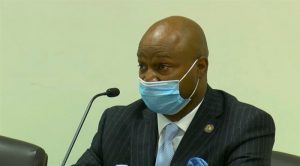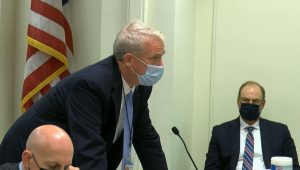Democratic chairman calls talk of Madigan subpoena ‘premature’
By Sarah Mansur For Capitol News Illinois — September 30, 2020
Rep. Emanuel “Chris” Welch, D-Hillside, chairs the Special Investigating Committee of House Speaker Michael Madigan on Tuesday, Sept. 29. (Blueroomstream.com)
SPRINGFIELD –Illinois House Republicans on a special committee investigating House Speaker Michael Madigan’s role in a bribery scheme involving Commonwealth Edison sought to tie the longtime leader directly to the $1.3 million in payments over nearly a decade made by the utility giant to his associates.
House Republicans also pressed on Tuesday, Sept. 29 for issuing subpoenas to multiple potential witnesses, including Madigan, as well as former ComEd CEO Anne Pramaggiore, and former ComEd lobbyist Michael McClain.
When Rep. Deanne Mazzochi, R-Elmhurst, made a motion to vote on whether the committee should issue subpoenas, the committee’s chairman, Rep. Emanuel “Chris” Welch, D-Hillside, said the motion was “out of order,” and did not allow the vote, citing his discretion as chairman.
House rules state a special investigative committee “may, in the discretion of the Chairperson, administer oaths and compel by subpoena…any person to appear and give testimony as a witness or produce papers, documents, or other materials relevant to the charge or charges.”
Welch also called the issuance of subpoenas premature.
“You’re asking this committee to vote to approve subpoenas that we haven’t seen, and we haven’t discussed,” Welch said.
However, both sides agreed that the committee would benefit from the testimony of Fidel Marquez, former senior vice president of governmental and external affairs at ComEd.
About an hour before the committee hearing began, Marquez pleaded guilty to one count of bribery for his role in the ComEd patronage scheme.

House Republican Leader Jim Durkin speaks to the Special Investigating Committee of House Speaker Michael Madigan in an exchange about whether Durkin would be allowed to give an opening statement on Tuesday, Sept. 29. (Blueroomstream.com)
Welch acknowledged the guilty plea before the committee hearing ended, adding that the committee would be in touch with Marquez’s attorney “to determine what our next steps should be.”
Tuesday’s hearing kicked off with a clash between Welch and House Minority Leader Jim Durkin, R-Western Springs, who initiated the disciplinary process under House rules.
Welch argued that Durkin could not make an opening statement since he is not a committee member and because he signed a petition accusing Madigan of wrongdoing.
Welch ultimately allowed Durkin to give an opening statement, but not to question the witness.
In his opening statement, Durkin said the evidence will establish that Madigan engaged in “conduct unbecoming to a legislator or which constitutes a breach of public trust.”
“The evidence will be direct, strong and convincing,” Durkin said. “And we’ll meet the burden of proof for this committee – that is whether reasonable grounds exist to authorize charges.”
Mazzochi questioned ComEd Executive Vice President of Compliance and Audit David Glockner – the only witness at the five-hour hearing – to establish Madigan’s firsthand knowledge of a scheme from 2011 to 2019 seeking to “influence and reward” the House Speaker for legislation that would provide monetary benefits of more than $150 million to the utility.
In July, as part of a deferred prosecution agreement with the U.S. Attorney’s Office in Chicago, ComEd admitted it arranged for associates of Madigan “to obtain jobs, vendor subcontracts, and monetary payments associated with those jobs and subcontracts from ComEd, even in instances where certain political allies and workers performed little or no work that they were purportedly hired to perform for ComEd.”
Madigan has not been charged with any crime and denies wrongdoing.
Mazzochi asked Glockner about a section in the DPA that stated that “Consultant 1,” identified as former City Club of Chicago President Jay Doherty, “had ‘every reason to believe’ that Individual A had spoken to Public Official A about the retention of Public Official A’s associates.”
“Is it reasonable to infer that Mr. Madigan had knowledge of the scheme from that, from ComEd’s perspective?” Mazzochi asked.
Glockner said he wasn’t in a position to comment on that inquiry.
“ComEd has acknowledged repeatedly through the agreement that it believed or intended to influence the speaker through its conduct. Whether it in fact … influenced the speaker, whether the speaker was aware of its intent to influence – those are questions that I’m not in a position to comment on,” Glockner said.
Democrats on the special investigative committee – including Welch, Reps. Elizabeth Hernandez of Cicero, and Natalie Manley of Joliet – pushed back on the Republicans’ narrative, insisting that Madigan simply made hiring recommendations.
“So, there’s nothing really inappropriate about making job recommendations. But why was ComEd not monitoring their employees?” Manley asked during the hearing, alluding to recommended employees who did “little or no work” for the company, according the DPA.
At a news conference following the hearing, Welch claimed Glockner’s testimony affirmed that Madigan had no personal knowledge of the nine-year bribery scheme.
When asked whether he would support a subpoena of Madigan, Welch said the request is premature.
“I think there’s more work that needs to be done. We’re going to take it under advisement. Just like we’ve done with every other request they’ve made. We are going to look into it,” Welch said.
news@capitolnewsillinois.com







